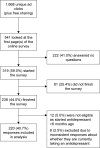The effect of knowledge and expectations on adherence to and persistence with antidepressants
- PMID: 27226710
- PMCID: PMC4866829
- DOI: 10.2147/PPA.S99803
The effect of knowledge and expectations on adherence to and persistence with antidepressants
Abstract
Purpose: Adherence to and persistence with antidepressants are often suboptimal. However, little is known about how patient knowledge and outcome expectations may influence antidepressant adherence and persistence.
Method: Individuals who had been prescribed their first antidepressant to treat depression in the preceding 6 months were recruited to an online survey via Facebook. Knowledge, education received, and initial outcome expectations were analyzed for associations with persistence and adherence.
Results: Two hundred and twenty surveys were analyzed. A total of 117 participants had taken their antidepressant for at least 3 months; another 25 had never started or stopped after <3 months without consulting their doctor. Differences in expectations and various educational messages among persistent and nonpersistent participants were identified. Having received the instruction "don't stop it without checking with your doctor" was a significant independent predictor of persistence (odds ratio [OR] =5.9, 95% confidence interval [CI] =1.4-24.5). At the time of the survey, 82.7% of participants were taking an antidepressant and 77.9% were adherent. Significant independent predictors of adherence were a greater age (OR =1.1, 95% CI =1.0-1.2), knowledge (OR =1.6, 95% CI =1.1-2.3), being informed of common side effects (OR =5.5, 95% CI =1.1-29.0), and having discussed ways to solve problems (OR =3.9, 95% CI =1.1-14.5).
Conclusion: Improving outcome expectations and particular educational messages may increase adherence and persistence. Greater knowledge may enhance adherence. Further investigation is warranted to determine whether a focus on these simple educational messages will improve outcomes in patients who commence an antidepressant.
Keywords: Facebook; counseling; depression; education.
Similar articles
-
The role of the primary care physician in patients' adherence to antidepressant therapy.Med Care. 1995 Jan;33(1):67-74. doi: 10.1097/00005650-199501000-00006. Med Care. 1995. PMID: 7823648
-
Impact of adherence to antidepressants on healthcare outcomes and costs among patients with type 2 diabetes and comorbid major depressive disorder.Curr Med Res Opin. 2017 Oct;33(10):1879-1889. doi: 10.1080/03007995.2017.1347092. Epub 2017 Aug 2. Curr Med Res Opin. 2017. PMID: 28644095
-
Differences in medication adherence and healthcare resource utilization patterns: older versus newer antidepressant agents in patients with depression and/or anxiety disorders.CNS Drugs. 2008;22(11):963-73. doi: 10.2165/00023210-200822110-00005. CNS Drugs. 2008. PMID: 18840035
-
Adjuvant therapy with antidepressants for the management of inflammatory bowel disease.Cochrane Database Syst Rev. 2019 Apr 12;4(4):CD012680. doi: 10.1002/14651858.CD012680.pub2. Cochrane Database Syst Rev. 2019. PMID: 30977111 Free PMC article.
-
Factors predicting adherence to antidepressant treatment.Curr Opin Psychiatry. 2014 Sep;27(5):344-9. doi: 10.1097/YCO.0000000000000086. Curr Opin Psychiatry. 2014. PMID: 25033275 Review.
Cited by
-
A qualitative exploration of the healthcare challenges and pharmaceutical care needs of people with Parkinson's and their caregivers.Int J Clin Pharm. 2022 Feb;44(1):53-63. doi: 10.1007/s11096-021-01312-4. Epub 2021 Jul 27. Int J Clin Pharm. 2022. PMID: 34318400 Free PMC article.
-
Knowledge and Preferences Regarding Antidepressant Medication Among Depressed Latino Patients in Primary Care.J Nerv Ment Dis. 2017 Dec;205(12):952-959. doi: 10.1097/NMD.0000000000000754. J Nerv Ment Dis. 2017. PMID: 29076955 Free PMC article.
-
How to improve adherence to antidepressant treatments in patients with major depression: a psychoeducational consensus checklist.Ann Gen Psychiatry. 2020 Oct 12;19:61. doi: 10.1186/s12991-020-00306-2. eCollection 2020. Ann Gen Psychiatry. 2020. PMID: 33062034 Free PMC article. Review.
-
Social media recruitment for mental health research: A systematic review.Compr Psychiatry. 2020 Nov;103:152197. doi: 10.1016/j.comppsych.2020.152197. Epub 2020 Aug 12. Compr Psychiatry. 2020. PMID: 32992073 Free PMC article.
-
Time to first and sustained improvement in WOMAC domains among patients with osteoarthritis receiving tanezumab.Osteoarthr Cartil Open. 2022 Jul 2;4(3):100294. doi: 10.1016/j.ocarto.2022.100294. eCollection 2022 Sep. Osteoarthr Cartil Open. 2022. PMID: 36474952 Free PMC article.
References
-
- Cramer JA, Roy A, Burrell A, et al. Medication compliance and persistence: terminology and definitions. Value Health. 2008;11(1):44–47. - PubMed
-
- Pompili M, Serafini G, Del Casale A, et al. Improving adherence in mood disorders: the struggle against relapse, recurrence and suicide risk. Expert Rev Neurother. 2009;9(7):985–1004. - PubMed
-
- Therapeutic Guidelines Limited . Treatment of Depression. Melbourne: eTG complete; 2013.
-
- Rush AJ, Trivedi MH, Wisniewski SR, et al. Acute and longer-term outcomes in depressed outpatients requiring one or several treatment steps: a STAR*D report. Am J Psychiatry. 2006;163(11):1905–1917. - PubMed
LinkOut - more resources
Full Text Sources
Other Literature Sources


